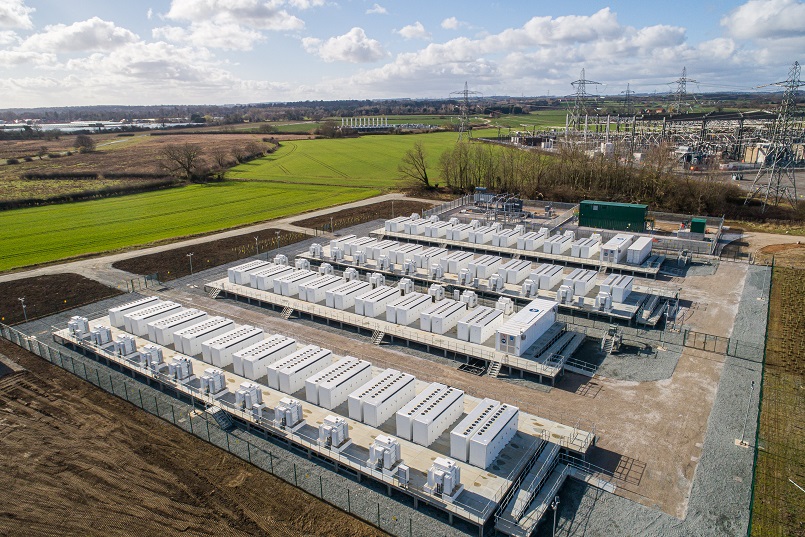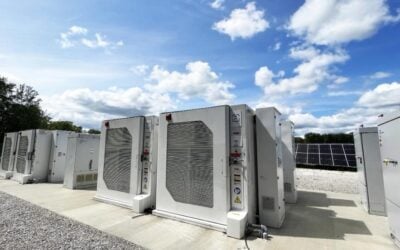
Europe’s biggest battery storage system in megawatt-hour (MWh) terms earned £2.3 million (US$2.85 million) revenues during its first full quarter in commercial operation.
UK-based investment fund Harmony Energy Income Trust said recently that its Pillswood Battery Energy Storage System (Pillswood BESS) in northern England was one of the best-performing battery storage assets in Britain in the first quarter of 2023.
Enjoy 12 months of exclusive analysis
- Regular insight and analysis of the industry’s biggest developments
- In-depth interviews with the industry’s leading figures
- Annual digital subscription to the PV Tech Power journal
- Discounts on Solar Media’s portfolio of events, in-person and virtual
As reported by our UK colleagues at Solar Power Portal, the investment fund’s renewable energy and storage developer-owner-investor company Harmony Energy made the claim in presenting a trading update for its activities as of the end of April.
At 98MW/196MWh, Pillswood BESS, in the county of Yorkshire, was energised in November 2022 and is located next to and connects to the National Grid Creyke Beck substation which will also be the grid interconnection point for Dogger Bank in the North Sea, currently the world’s largest planned offshore wind farm.
Pillswood BESS is claimed to be the largest BESS in Europe, a claim which appears to hold true, although various much larger projects are known to be in development, particularly in Great Britain (GB), the continent’s early leader in battery storage.
Harmony Energy itself has a project which began construction last summer through a joint venture (JV) with Fotowatio Renewable Ventures (FRV), and is slightly bigger, at 99MW/198MWh.
Project’s 2-hour duration discussed as early as 2016
What’s perhaps more important a takeaway than that however is Harmony Energy’s decision to pursue longer duration battery projects than has typically been seen to date in the GB market.
In the newest edition of our quarterly journal PV Tech Power (Vol.35), Harmony Energy development director Alex Thornton writes a case study and development history of the Pillswood BESS, offering insights into many of the decisions made and the process of getting the near-200MWh project financed and built.
Thornton writes that Harmony Energy began originating Pillswood as early as 2016. That was even before the game changing 200MW enhanced frequency response (EFR) tender hosted by National Grid awarded the UK’s first-ever tranche of long-term contracts for energy storage assets.
Harmony Energy took a “leap of faith” into the market, according to Thornton, believing that the strong fundamentals of the country’s need for energy storage would create a strong enough business case for lithium-ion battery storage assets.
“European and UK government policies were driving a reduction in emissions and, in the UK, we were also seeing a reduction in the reliance on centralised coal-fired power stations. With the resulting movement towards wind and solar, we firmly believed that BESS had an increasing role to play in the energy supply of the future,” Alex Thornton writes in his article.
From those early stages of planning and preparation, Harmony Energy was already speaking with Tesla about “the potential for 2-hour lithium batteries”. Tesla would eventually sign a contract to provide the project’s BESS equipment and manage market participation through its AutoBidder software platform in April 2021.
Longer durations a sign of shifting revenue stack potential
“Where other UK developers were only speaking about 30 minute or 1-hour duration batteries, we identified that the UK energy system would need longer duration storage as we continued to decarbonise and decentralise generation,” Thornton writes.
Indeed, data provided as part of Harmony Energy Income Trust’s Q1 2023 trading update shows that revenues for 2-hour duration BESS assets in the GB fleet were consistently higher and at times almost double the amount earned by projects with 1-hour to 1.49-hour duration between May 2022 and April 2023.
Various industry sources that have said the UK market for energy storage will continue to favour longer duration assets, and the market appears to be following that trend, or indeed creating it.
Most of the 20.7GW of grid-scale battery storage assets in planning during 2022 in the country – representing 295 potential sites – were expected to be “at least 2-hour duration”, according to an Energy-Storage.news Guest Blog published in February from Mollie McCorkindale, market analyst at Solar Media Market Research.
This was a marked difference from 2017, the year BESS buildout really began in the UK. Most projects at that time were either 0.5-hour or 1-hour duration, and the average project size in megawatt-hours was 4.4MWh. By 2022, the average size became 36MWh, again, partly due to the increase in duration, McCorkindale wrote.
As noted even before the end of 2022 by another market analyst, Corentin Baschet at Clean Horizon, batteries in the UK – and in the rest of Europe – are already moving towards applications that require longer durations, such as energy trading on day ahead, intraday or imbalance markets.
They may not be actively moving away from providing short duration, high power applications for ancillary services, but those revenues for short-term grid-balancing services are representing a smaller share of the total revenue stack than before.
“Typically, it is clear that batteries will have to move from power revenues, associated with FCR or DC, to energy revenues associated to trading on the day ahead or intraday or imbalance markets as these markets are deeper,” Baschet said back in November last year.
“Revenue cannibalisation for storage is a real thing,” Baschet added.
This appears to be playing out in real-time in Britain, where market data group Modo Energy recently said firm frequency response (FFR) ancillary service auction prices had fallen to a three-year low due to market saturation.
There are only so many megawatts of balancing services a grid needs and from prices in excess of £20/MW/hour from September to November 2022, reference price for April’s tender was just £5.69/MW/hour.
This is broadly expected to be the case across other ancillary service markets, and Harmony Energy, which is planning its portfolio of nine large-scale BESS projects (including Pillswood and one other that are already online) to all be 2-hour duration.
In its trading update, the company noted that the UK’s Balancing Mechanism, which is the primary mechanism for managing supply and demand on the grid in real-time, is well-suited to 2-hour duration assets of the type it is building.
It’s important to note as well that although ancillary services prices soared along with electricity prices last year as the Russian invasion of Ukraine’s knock-on effects played havoc with gas markets, that dynamic too is beginning to shift as prices come back down again, or at least don’t fluctuate as wildly as before.
You can read Alex Thornton from Harmony Energy’s case study: ‘How we delivered the 98MW/196MWh Pillswood BESS Project’ in PV Tech Power Vol.35, which is out now. Subscription to the quarterly journal, is included as part of the Energy-Storage.news Premium service. Every edition of PV Tech Power includes ‘Storage & Smart Power’, a dedicated section contributed by the Energy-Storage.news team.
This article and its headline have been amended from their original form to reflect that the £2.3 million in revenues were earned during Q1 2023, and not from late 2022 to the end of April, as was originally stated.






